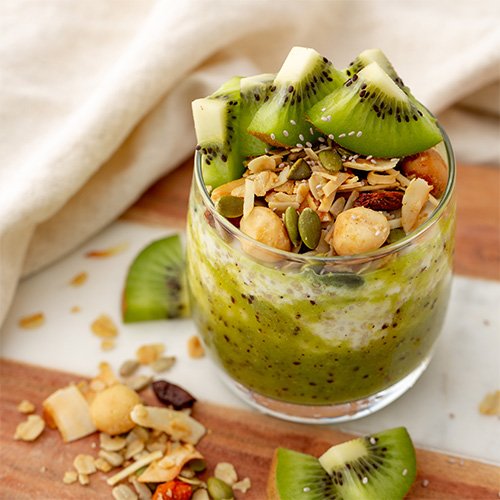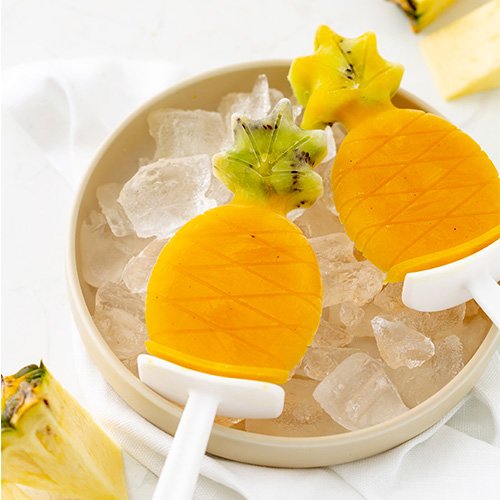Can a Kiwi a day keep the doctor away?
- Blog updated April 2024
Kiwi fruit is a nutrient dense and fibre rich fruit containing vitamins, minerals and phytochemicals. It is particularly rich in Vitamin C - more than 3 x the amount found in oranges per 100g. More than enough reason to enjoy daily then, but….
Kiwi fruit are also contain a lot of fibre, both insoluble and soluble fibre. One green kiwi fruit contains 2 to 3g of fibre.
There is plenty of anecdotal evidence, plus signals from their long-term use in traditional Chinese medicine to indicate that eating Kiwi fruits can relieve constipation. This together with patients’ preference for natural remedies over use of laxatives with their high cost and risk of side-effect has prompted clinicians to undertake clinical trials of Kiwi fruit as an alternative.
The science
The first study was undertaken by a group in New Zealand led by Elaine Rush (published in 2002). They recruited elderly participants living in the community. The participants alternated between their usual diet plus Kiwi fruit (1 for every 30 kg of body weight) each day or their usual diet without any Kiwi fruit. Eating the Kiwi fruit led to an increase in the frequency of bowel movements (poops) and an increase in the bulk and softness of poops.
Then in 2007 a group in Taiwan led by Annie Chan published a paper on the effects of eating 2 Kiwi fruit a day for 4 weeks on chronic constipation symptoms compared to a baseline period. The Kiwi fruit led to an increase in the number of complete, spontaneous, bowel movements (CSBM - or easy poops), a decrease in transit time and a decrease in the ‘bothersomeness of constipation’.
The first study to specifically include people with IBS-C (constipation predominant IBS) was by Chun-Chao Chang and colleagues in Taiwan (published in 2010). They compared a group with IBS-C eating 2 green Kiwi fruit a day with a control group with IBS-C taking a placebo tablet daily for 4 weeks. The Kiwi fruit led to increased poop frequency and a decrease in the colon transit time.
Studies then moved on to comparing green Kiwi fruit to a common natural remedy for constipation – psyllium, and examining the broader effects of Kiwi fruit on gut symptoms. The first was by Giovanni Barbara and colleagues (first published as an abstract in 2018, and later as a full paper as Gearry et al. 2023). Their study spanned three countries, Italy, New Zealand and Japan and included people with IBS-C and with people with functional constipation. Consumption of green Kiwi fruit was associated with a greater increase in the number of CSBMs (easy poops) per week than psyllium and the Kiwi fruit also led to improved measures of gastrointestinal comfort in the IBS-C group.
William Chey and colleagues conducted a similar study in the USA, comparing the effects of intake of 2 green Kiwi fruit a day to prunes or psyllium. (published in 2021). The Kiwi fruit, prunes and psyllium all improved bowel movements, but bloating was only reduced in the Kiwi fruit group. The Kiwi fruit group also reported the greatest satisfaction with the intervention and the lowest rate of abdominal pain.
Go for Green and Gold
Since then, Simone Bayer and colleagues in New Zealand have found that Gold Kiwi Fruit can also improve constipation (published 2022). If you like your Kiwi fruit sweeter, you can try this option.
It also been found that there could be additional benefits of eating the skin in addition to the flesh of gold Kiwi fruits. Sarah Eady and colleagues found that consuming the flesh of three gold Kiwi fruit per day led to an additional bowel movement per week, whilst consuming the skin and flesh led to two additional bowel movements per week in participants with IBS-C (published 2020 ). Straining was also reduced. These effects were probably due to the additional fibre provided by the skin.
Zespri who bred the gold Kiwi fruit have also come up with the new RubyRed Kiwi Fruit, which has pink coloured anthocyanin compounds in the flesh. Like the other two types of Kiwi fruit, it has been tested and certified low FODMAP by Monash university. It looks amazing. We’ve checked with Zespri and they said that unfortunately we won’t see it on the shelves in Australia in this year - but the good news is that the new season for Zespri SunGold Kiwi fruit is expected to start next week, so they should be available in abundance very soon.
How does it work?
It appears that the fibre in the Kiwi fruit is important. It seems that the Kiwi fruit fibre has exceptional water-holding capacity. The absorbed water increases bulk poop and softens the poop. There is also speculation that other nutrients may have an effect including an enzyme found in Kiwi fruit called Actinidin. However, this needs further research.
How best to enjoy them?
We’ve seen that there is now a bucketful of clinical evidence to back eating Kiwi fruit daily if you want to combat constipation. Stick to a low FODMAP serve of 2 per meal.
What are the best ways to enjoy them? We think they are a great food to tick off the list at breakfast. They work well with yoghurt (lactose-free or coconut yoghurt, if you wish), or on top of muesli. Our favourite way to enjoy kiwi fruit though is in Kiwi Chia pots. Check out our recipe here.
If it is a hot day you could try combining them with our Tropical+ Daily Gut Health Boost in these icy poles. Making them is also a great activity for the school holidays.
If you generally prefer natural remedies for regularity, check out our Best Ever Poop Plan for more dietary and lifestyle changes you can make to help you achieve your Best Ever Poop.
Written by: Dr Mary Webberley, Chief Scientific Officer at Noisy Guts. Mary has a background in biology, with two degrees from the University of Cambridge and post-doctoral research experience. She spent several years undertaking research into the diagnosis of IBS and IBD. She was the winner of the 2018 CSIRO Breakout Female Scientist Award.
References:
Rush EC, Patel M, Plank LD, Ferguson LR. Kiwifruit promotes laxation in the elderly. Asia Pac J Clin Nutr. 2002;11:164-8.
Chan AO, Leung G, Tong T, Wong NYH. Increasing dietary fiber intake in terms of kiwifruit improves constipation in Chinese patients. World J Gastroenterol. 2007;13:4771-5.
Chang C, Lin Y, Lu Y, Liu Y, Liu J. Kiwifruit improves bowel function in patients with irritable bowel syndrome with constipation. Asia Pacific Journal of Clinical Nutrition. 2010; 19(4), 451-7.
Barbara G, Fukudo S, Drummond L, et al. Green kiwifruit compared to psyllium for the relief of constipation and improving digestive comfort in patients with functional constipation and constipation predominant irritable bowel syndrome—analysis of three international trial centres. Gastroenterology 2018;154:S-979–S-980.
Gearry R, Fukudo S, Barbara G, et al. Consumption of 2 Green Kiwifruits Daily Improves Constipation and Abdominal Comfort-Results of an International Multicenter Randomized Controlled Trial. Am J Gastroenterol. 2023; 1;118(6):1058-1068.
Chey SW, Chey WD, Jackson K, Eswaran S. Exploratory Comparative Effectiveness Trial of Green Kiwifruit, Psyllium, or Prunes in US Patients With Chronic Constipation. Am J Gastroenterol. 2021 Jun 1;116(6):1304-1312.
Bayer SB, Heenan P, Frampton C, Wall CL, et al. Two Gold Kiwifruit Daily for Effective Treatment of Constipation in Adults-A Randomized Clinical Trial. Nutrients. 2022 Oct 6;14(19):4146.
Eady SL, Wallace AJ, Hedderley DI, et al. The Effects on Immune Function and Digestive Health of Consuming the Skin and Flesh of Zespri® SunGold Kiwifruit (Actinidia Chinensis var. Chinensis 'Zesy002') in Healthy and IBS-Constipated Individuals. Nutrients. 2020 May 18;12(5):1453.




